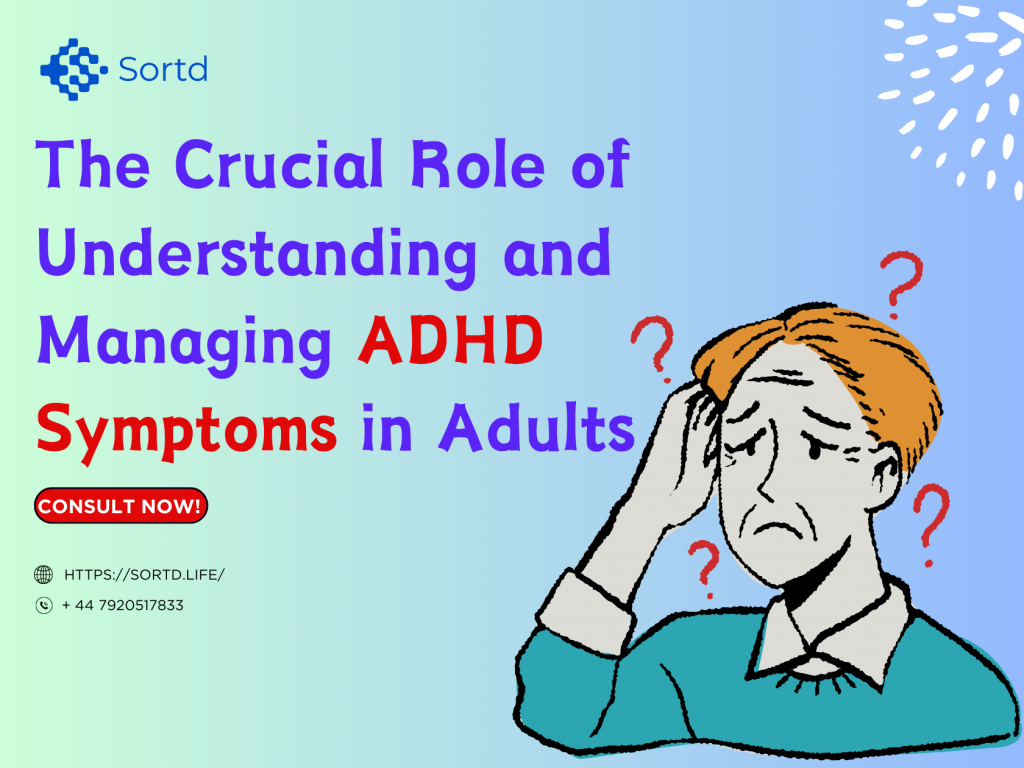
The Crucial Role of Understanding and Managing ADHD Symptoms in Adults
Attention Deficit Hyperactivity Disorder (ADHD), often associated with childhood, can persist into adulthood, impacting various aspects of daily life. Understanding and managing ADHD symptoms in adults is crucial for fostering personal and professional success. In this blog post, we’ll explore the importance of recognizing and effectively handling ADHD symptoms to empower adults on their journey to a balanced and fulfilling life.
1. Recognizing Adult ADHD
Contrary to popular belief, ADHD is not exclusive to childhood. Many individuals continue to grapple with its challenges into adulthood. Recognizing symptoms such as inattention, impulsivity, and hyperactivity in an adult context is the first step toward effective management.
2. Impact on Professional Life
ADHD symptoms can significantly influence work performance and career trajectories. Difficulties in sustaining attention, staying organized, and managing time can create hurdles in the workplace. Understanding these challenges is essential for implementing strategies that enhance productivity and job satisfaction.
3. Navigating Relationship Dynamics
ADHD can affect personal relationships, leading to misunderstandings and communication breakdowns. By comprehending the impact of symptoms on interactions and emotions, adults with ADHD can work towards building stronger, more resilient connections.
4. Emotional Well-Being
Managing ADHD symptoms is closely linked to emotional well-being. Individuals may face frustration, anxiety, or feelings of inadequacy. By acknowledging and addressing these emotions, adults with ADHD can cultivate resilience and develop coping mechanisms for a more balanced mental state.
5. Educational Pursuits
Understanding ADHD is crucial for those pursuing education in adulthood. Challenges in concentration and time management may affect academic performance. Implementing tailored strategies and seeking support can make educational pursuits more manageable and rewarding.
6. Effective Time Management
Time management is a common struggle for adults with ADHD. Learning effective time-management techniques, breaking tasks into smaller steps, and utilizing tools like planners or digital apps can aid in overcoming these challenges.
7. Seeking Professional Support
The importance of seeking online Mental Health therapist help cannot be overstated. Consultation with healthcare providers, therapists, or ADHD coaches can provide personalized strategies, coping mechanisms, and, if necessary, medication management to optimize daily functioning.
8. Lifestyle Adjustments
Adopting a holistic approach involves making lifestyle adjustments that complement ADHD management. Regular exercise, a balanced diet, and sufficient sleep contribute to overall well-being and can positively impact ADHD symptoms.
9. Building a Support System
Cultivating a strong support system is invaluable. Educating friends, family, and colleagues about ADHD fosters understanding and creates an environment conducive to success. Open communication helps in garnering the support needed for navigating challenges.
10. Celebrating Strengths
While managing challenges is crucial, acknowledging and celebrating strengths associated with ADHD is equally important. Creativity, resilience, and hyperfocus are among the positive attributes that can be channeled for personal and professional growth.
Conclusion:
Understanding and managing symptoms of ADHD in adults is a transformative journey toward self-discovery and empowerment. By recognizing the impact of ADHD on various facets of life and implementing tailored strategies, individuals can navigate challenges, leverage strengths, and forge a path toward a fulfilling and balanced adulthood. Embracing the uniqueness of the ADHD experience allows individuals to thrive, not despite ADHD but because of the strengths inherent in their neurodiversity. Connect with a Mental Health Counselor in London
